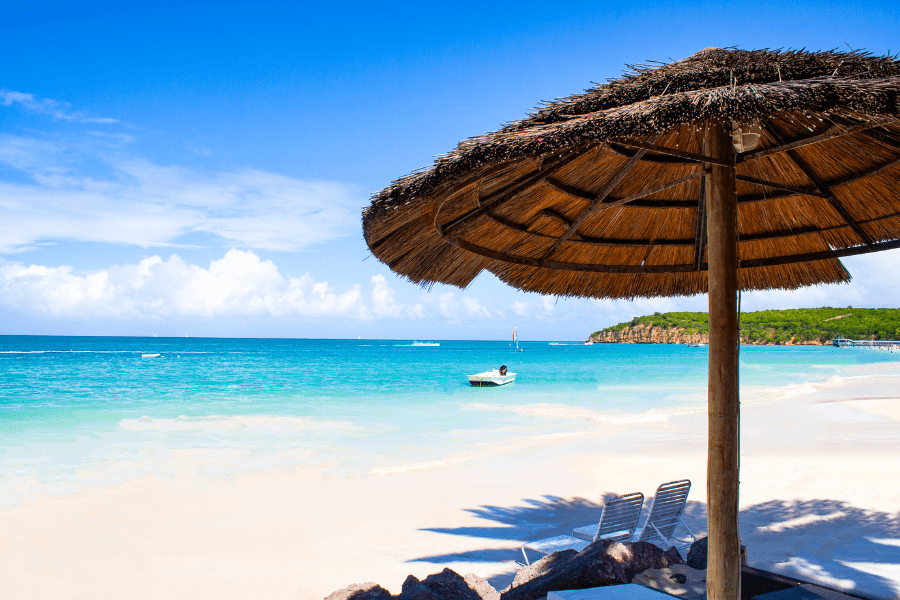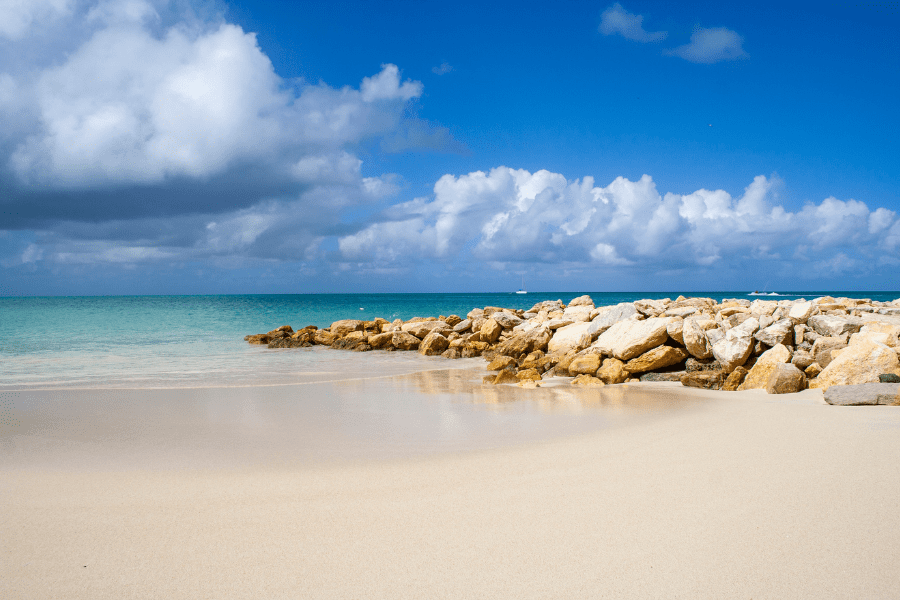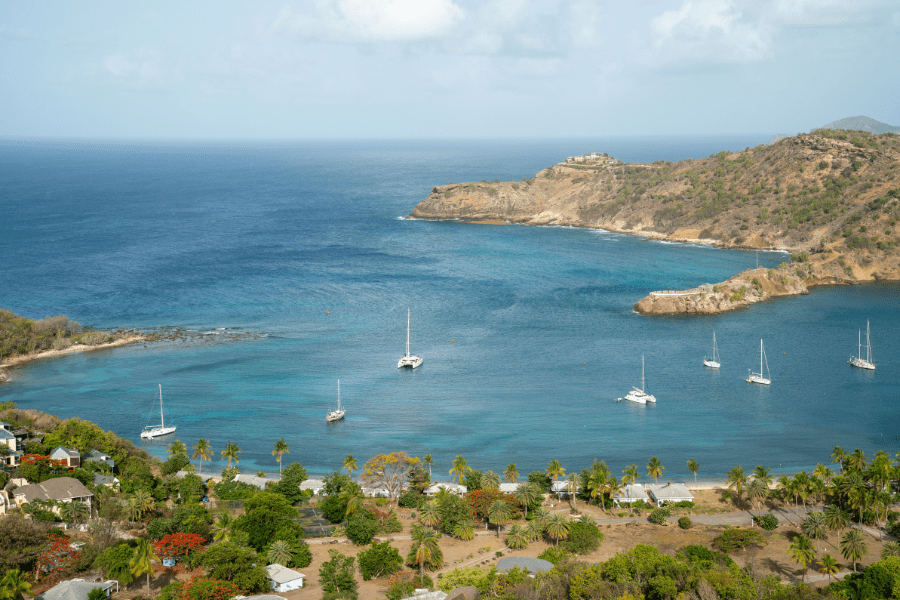Antigua and Barbuda Taxes: The Ultimate Guide
November 28, 2024
Forget the usual Caribbean narrative of sun-drenched beaches and carefree escapes.
While Antigua and Barbuda certainly offers those in abundance, it’s also attracting investors, entrepreneurs and global citizens seeking a lifestyle that blends financial freedom with sophisticated island living.
They’re drawn to a life where they can keep more of their money from tax-hungry governments, freeing it up for them to use as they wish.
This is the reality that Antigua and Barbuda presents: it’s a haven for those who refuse to be bound by geographic limitations or excessive tax burdens and who seek to make the most of their lives on a global scale.
Here, you can settle into a relaxed yet modern lifestyle amidst stunning natural beauty, vibrant culture and a welcoming community.
But, before giving you the lowdown on Antigua and Barbuda’s tax regime, let’s take a look at these two Caribbean islands.
Why Antigua and Barbuda?
Simply put, Antigua and Barbuda offers a compelling combination of tax efficiency and an exceptional quality of life.
For high-net-worth individuals, the absence of personal income tax, as well as no capital gains or inheritance taxes, creates a highly favourable environment for wealth preservation.
Additionally, the flat tax for tax residency options makes it easier to establish a financial presence without unnecessary complexity.
In recent years, the island nation has transformed into one of the wealthiest in the Caribbean, driven by a thriving tourism industry and a robust offshore financial services sector.
This success is underpinned by a high standard of living and a stable currency – the Eastern Caribbean dollar, pegged to the US dollar at a reliable rate of US$1 to $2.70.
Beyond taxation and the strong economy, the islands provide a sophisticated lifestyle with modern infrastructure, boutique investment opportunities and excellent real estate geared toward affluent individuals.
With a stable government, strong international ties and a reputation for financial security, Antigua and Barbuda is a reliable choice for those looking to optimise their global tax strategy.
You’ll also enjoy the low-key luxury of island life – relaxation intertwined with vibrant cultural events like Carnival, a welcoming community and a location offering easy access to both North and South America.

Antigua and Barbuda Personal Taxes
As of April 2016, Antigua and Barbuda implemented tax reforms that eliminated personal income taxes.
On top of that, you won’t have to worry about paying capital gains, inheritance or wealth tax in this jurisdiction, making it extremely close to a traditional tax haven.
In fact, the only tax you have to pay on a personal level is a transfer tax for gifts.
Do note that if you are a US citizen, you will still have to declare any worldwide income to the IRS, including any income accrued on the islands.

Antigua and Barbuda Corporate Tax Rate
The corporate tax rate in Antigua and Barbuda is 25%.
A company is considered a resident company and liable for corporate tax if it is:
- Managed and controlled in Antigua and Barbuda
- Operates in Antigua and Barbuda
- Incorporated in Antigua and Barbuda
- Receives income from Antigua and Barbuda
- Owns assets in Antigua and Barbuda that are used to generate income.
Unincorporated business tax is applied on a sliding scale with rates ranging from 0% to 25% of gross income, whether it’s local or worldwide income derived from other countries.
Non-resident companies are liable to unincorporated business taxation on income derived from within Antigua and Barbuda only. Unincorporated business tax is due quarterly instead of annually.
Understanding International Business Corporation Rules in Antigua and Barbuda
An International Business Corporation (IBC) is a tax-exempt company requiring only one shareholder and one director who can be the same person or legal entity from any country. Foreigners may own all of the corporate shares in an IBC.
There is a 50-year tax exemption for IBCs in Antigua and Barbuda. This tax liability exemption applies to most forms of income, dividends, interest and royalties paid by and to foreigners.
While there is no requirement to file audited accounts or annual returns with the authorities, a company is required to keep financial records, which should reflect the financial position of a company.
Antigua and Barbuda IBCs cannot trade within Antigua and Barbuda or own real estate there. An IBC cannot offer its shares for sale to the public.
An Antigua and Barbuda IBC cannot undertake the business of banking, insurance, assurance, reinsurance, fund management, collective investment schemes, trust management, trusteeship, the rendering of investment advice or any other activity that would suggest an association with the banking or insurance industries. This refers to all financial institutions.
The Benefits of International Business Corporations in Antigua and Barbuda
As you can probably see, an IBC in Antigua and Barbuda is a great option for corporations who want to eliminate their tax burden. Beyond that, there are a few other benefits:
- All of the shareholders can be foreigners
- The names of beneficial owners and shareholders are never included in any public records
- The IBC’s assets are never disclosed in public records and are owned by the IBC as an independent legal body from the shareholders
- An IBC can be formed and registered within one day
- Only one shareholder is required, who may be the sole director for total control of the IBC
- There is no minimum authorised capital requirement.
How to Get Tax Residency in Antigua and Barbuda
The appeal of Antigua and Barbuda as a tax residency is its 0% personal income tax. So if you’re looking for a favourable tax system, this Caribbean country is a good place to start.
You can apply for tax residency online once you meet specific requirements. You can choose from three options to enjoy tax-free status on these islands.
The first one includes spending a minimum of 183 days a year in Antigua and Barbuda.
If your schedule doesn’t allow you to spend much time on a tropical island, Antigua and Barbuda does have a second option for you. You must maintain a place of residence in Antigua and Barbuda (leased or owned), spend at least 30 days a year there and pay a flat tax of US$20,000 annually.
Keep in mind, however, that you cannot establish a tax residence anywhere else if you wish to remain tax residents on the islands.
This second type of Antigua and Barbuda tax residency works best if you are a wealthy entrepreneur or a perpetual traveller. It ensures you are exempt from being taxed on your worldwide income.
In addition, a foreign tax credit is available to those who have paid or are liable for British Commonwealth income tax.
After applying to become a tax resident in Antigua and Barbuda, it takes one to four months to complete the process and receive your tax ID number.
The third option involves becoming a citizen of the islands, which we’ll explain more in the next section.

How to Get Residency or Citizenship in Antigua and Barbuda
Aside from spending 183 days per year in the country, the option of obtaining a permanent residence to qualify for tax residency will require some more paperwork. Citizenship is a completely different beast altogether.
Getting Residency in Antigua and Barbuda
To obtain permanent residency in Antigua and Barbuda, fill in the Permanent Residence Scheme application form and return it to the Ministry of Legal Affairs. Sections include:
- Name, permanent address, business address
- Type of business, annual gross income and source of gross income
- Antigua and Barbuda residential address, contact info
- Passport details
- Date and place of birth, nationality, marital status, sex
- Name of spouse and names of children under 18 and dates of birth
- Names and addresses of two referees
- Status of application and name and address of any agent
- Criminal record.
You will need to submit the following documents with your application:
- Certified copy of your birth certificate
- Certified copy of your passport biometrics page
- Two passport-sized photographs
- Original police report for the past two years
- Original bank reference letter
- Testimonials from your two referees
- Original medical reports, signed and stamped by the physician
- Certified copy of the Certificate of Naturalisation (if applicable)
- Lease or title to the property in Antigua and Barbuda.
Getting Citizenship in Antigua and Barbuda
Citizenship can be acquired via the citizenship by investment program, which consists of investment in real estate, the National Development Fund or the University of West Indies Fund.
As a Nomad Capitalist client we can talk you through the different options to help find the best solution for your needs.
Antigua and Barbuda Taxes: FAQs
Sales tax in Antigua and Barbuda is called ABST and is typically set at a flat rate of 17%. However, there are exceptions to this Antigua tax. Hotels and holiday accommodations are subject to a 12.5% sales tax, while other goods and services have a reduced sales tax rate of 10.5%. However, certain items are exempt from sales tax.
Yes and no. Yes, you do have to pay property tax on the market value of any residential purchases in Antigua. No, you do not have to pay property tax on the market value if you buy a residence in Barbuda. It is a uniquely Antigua tax.
Yes, stamp duty is applied to real estate transactions. The seller pays 7.5% of this stamp tax and the buyer contributes 2.5% of the taxable value.
The tax year is based on the company’s fiscal year-end, and the due date for tax returns is March 31. There are no tax holidays. The tax return date is final.
Antigua and Barbuda doesn’t have any Controlled Foreign Corporation rules in place. Ownership of the offshore company by a person resident in Antigua and Barbuda will have no impact on that company’s tax status, except if that company is managed and controlled from Antigua and Barbuda.
If an offshore company makes money from a company based within the islands, that money will be considered coming from Antigua and Barbuda and will be subject to taxes there. Companies registered, incorporated or continued in Antigua and Barbuda must pay a 25% tax on all their profits.
Avoid Securing Corporate Residence and Tax Residency in the Same Location
You can avoid paying corporate tax by not working in Antigua and Barbuda.
You could essentially set up your business in Hong Kong where there is no corporate tax on overseas income, and establish tax residency in Antigua and Barbuda to avoid paying worldwide tax.
There are more options than you might think when setting up a lifestyle that allows you to pay zero or very low taxes. We’re here to help you get it right.


Does Puerto Rico Pay Taxes to the US?
It’s a common question and one that often fuels confusion, debate, and a fair share of misinformation – Do residents of Puerto Rico actually pay US federal taxes? When most people think of US tax obligations, they naturally assume they apply uniformly across all US citizens. But when it comes to Puerto Rico, things are […]
Read more

How to Eliminate US Expat Taxes (by Renouncing)
A common myth persists among many Americans that they can’t benefit from the same tax-saving opportunities as other expats when moving overseas. That misconception is rooted in the United States’ insistence on implementing citizenship-based taxation, requiring their citizens to report and pay tax on their worldwide income – regardless of where they live. As a […]
Read more

How to Pay Zero Tax in Latin America
Latin America has a reputation among many investors as a ‘tax hell’, and its headline tax rates seem to bear out this theory. Colombia taxes top earners at 39%, Ecuador at 37%, and Chile climbs to 35.5%. Those aren’t tax rates to sniff at – they’d make a freedom-sized hole in any annual tax return. […]
Read more




